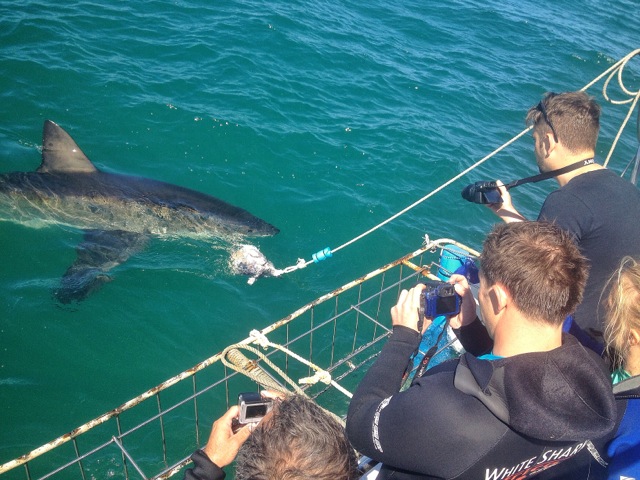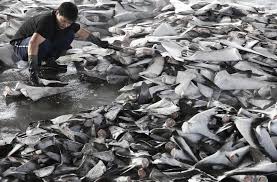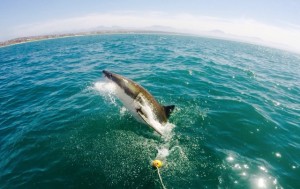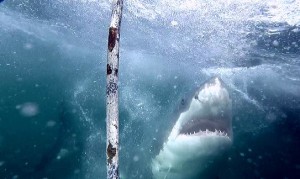Marine Life & Conservation
Consider Cage Diving

Great white shark cage diving has become a growing industry in areas such as Australia, Mexico, and South Africa. Whether for an interest in sharks, an adrenaline rush, or a spontaneous vacation adventure, thousands of tourists eagerly plunge into cages to experience the great white shark in its natural environment.
Despite the growing industry, there are many controversial issues regarding white shark cage diving and the possible negative effects it may cause the animal. Some believe that sharks are drawn into areas they would not normally be. Others believe that chumming for sharks teaches them to associate boats – and humans – with food. The most controversial issue however must be around ensuring the safety of the sharks during cage diving activities as well as the safety of the divers in the cage. Many people believe that sharks are being purposely led or dragged into the cages to add to the excitement and experience of clients.
On the other hand there are many how believe that cage diving plays an important role towards promoting Shark conservation by raising awareness and trying to change the negative perception people have of these animals.
 Sharks are being killed worldwide at an unsustainable rate. It is estimated a staggering 100 million sharks die at the hands of humans each year. 70 million of those are thought to be as a result of shark finning. As the shark fin soup industry grows in China, it puts added pressure on fishermen to kill increasing numbers of sharks. In this particular industry, the fins are the focus of interest, leaving no concern for the well-being of the shark once the fins are removed. Often the shark is thrown back into the ocean, unable to swim which leads to death caused either by drowning or by becoming defenceless pray. Aside from the shark finning industry, sport fishing, beach nets, and by-catch are also aiding in diminishing shark numbers across the world. Currently, 90% of shark species are believed to be endangered.
Sharks are being killed worldwide at an unsustainable rate. It is estimated a staggering 100 million sharks die at the hands of humans each year. 70 million of those are thought to be as a result of shark finning. As the shark fin soup industry grows in China, it puts added pressure on fishermen to kill increasing numbers of sharks. In this particular industry, the fins are the focus of interest, leaving no concern for the well-being of the shark once the fins are removed. Often the shark is thrown back into the ocean, unable to swim which leads to death caused either by drowning or by becoming defenceless pray. Aside from the shark finning industry, sport fishing, beach nets, and by-catch are also aiding in diminishing shark numbers across the world. Currently, 90% of shark species are believed to be endangered.
It is a worldwide common misconception that the shark is to be a feared predator. This misunderstanding of the great white shark generates negative perspectives on the animal making support on issues concerning the sharks a challenging matter of contention.
White shark cage diving gives an opportunity for an understanding of the animal through education provided through crew members during the experience on the boat and inside the cage. As the clients see the sharks for themselves, a pre-conceived opinion of a mindless killer can change to that of respect and admiration for an apex predator. If no education or research is being done by white shark cage operators, then it is simply a business, contributing nothing to the protection and conservation to these animals, merely providing tourists with their great underwater photos of a massive shark.
 In South Africa, the right to own a cage diving permit is closely coupled with the responsibility to contribute towards conservation and research. A responsible cage diving company will remain within strict permit guidelines and adhere to criteria set by the Governing body. For instance, the bait handler’s job is to entice the sharks as close to the cage as possible, avoiding contact between the shark and the cage or boat. A skilled bait handler is able to keep the bait (usually a tuna head) out of reach, should the shark lunge towards it, but also avoid leading the shark to collide with the cage, which can be extremely difficult in low visibility conditions. If the shark decides to breach on the bait, the handler may not see it until it hits the surface. Throwing the bait out a safe distance from the cage minimizes the risk of the shark hitting or landing on the cage. Of course in this instance, the clients in the cage will see nothing of the shark underwater. It’s also important to remember that every shark behaves differently. Much like people, each have their own personality, making it difficult to predict the movements of a shark around the boat. The bait handlers most geared towards conservation will put shark safety above clients getting their close up.
In South Africa, the right to own a cage diving permit is closely coupled with the responsibility to contribute towards conservation and research. A responsible cage diving company will remain within strict permit guidelines and adhere to criteria set by the Governing body. For instance, the bait handler’s job is to entice the sharks as close to the cage as possible, avoiding contact between the shark and the cage or boat. A skilled bait handler is able to keep the bait (usually a tuna head) out of reach, should the shark lunge towards it, but also avoid leading the shark to collide with the cage, which can be extremely difficult in low visibility conditions. If the shark decides to breach on the bait, the handler may not see it until it hits the surface. Throwing the bait out a safe distance from the cage minimizes the risk of the shark hitting or landing on the cage. Of course in this instance, the clients in the cage will see nothing of the shark underwater. It’s also important to remember that every shark behaves differently. Much like people, each have their own personality, making it difficult to predict the movements of a shark around the boat. The bait handlers most geared towards conservation will put shark safety above clients getting their close up.
Conversing with clients is another important conservation tool that is used by most cage diving companies. With anything between 5-30 clients on a cage diving shark trip, there is a fantastic opportunity here for crew and biologists to be in conversation with clients about the animals they are seeing and the behaviour they are witnessing. Interesting facts conveyed in the right way make the trip educational and fun while helping to change the negative image attached to the sharks. Further information about the area they are in, as well as the food they eat is also important for understanding white shark behaviour. This makes having crew members that are passionate and open to taking with clients essential on the boat.
 For a responsible operator, client safety is extremely important. At the start of every tour, there is a safety briefing from a member of the crew or in the form of a video presentation. This outlines what the client can expect from the day, and in particular, how to make sure the day is safe for everyone on board. Emergency procedures should be explained in detail and the client should board the boat feeling safe and comfortable with the crew. As part of the safety briefing, clients are warned not to touch the sharks. This may seem like an obvious warning, but there have been many cases of divers wanting to get even closer, pushing their arms and cameras through the cage, leading to injuries caused either by the jaws or a shark’s tough skin. To avoid this most cages are built with an inner rail, for divers to hold on to and push themselves under water as sharks pass by. Those that try and touch sharks are usually removed from the cage.
For a responsible operator, client safety is extremely important. At the start of every tour, there is a safety briefing from a member of the crew or in the form of a video presentation. This outlines what the client can expect from the day, and in particular, how to make sure the day is safe for everyone on board. Emergency procedures should be explained in detail and the client should board the boat feeling safe and comfortable with the crew. As part of the safety briefing, clients are warned not to touch the sharks. This may seem like an obvious warning, but there have been many cases of divers wanting to get even closer, pushing their arms and cameras through the cage, leading to injuries caused either by the jaws or a shark’s tough skin. To avoid this most cages are built with an inner rail, for divers to hold on to and push themselves under water as sharks pass by. Those that try and touch sharks are usually removed from the cage.
In the case of bad weather conditions, trips are usually cancelled. Should a trip go ahead in poor conditions, the experience in the shark cage can be very unpleasant. If an operator goes out in poor conditions, it shows more of a focus on business than shark conservation.
In order to save sharks from extinction it is important for clients who seek the cage diving experience to be given the opportunity to see not only how sharks behave in the wild, but also factual information given by passionate crew members. This type of mindset spreading throughout the world gives a chance for positive outlooks and attitudes towards the sharks.
To find out more about Shark Conservation opportunities and how you can make a difference visit www.wsaecoprogram.co.za.
[youtube id=”0qDVgRs5ZIs” width=”100%” height=”400px”]
Marine Life & Conservation
Leading UK-based shark conservation charity, the Shark Trust, is delighted to announce tour operator Diverse Travel as a Corporate Patron

 Corporate Patrons provide a valuable boost to the work of The Shark Trust. The Trust team works globally to safeguard the future of sharks, and their close cousins, the skates and rays, engaging with a global network of scientists, policymakers, conservation professionals, businesses and supporters to further shark conservation.
Corporate Patrons provide a valuable boost to the work of The Shark Trust. The Trust team works globally to safeguard the future of sharks, and their close cousins, the skates and rays, engaging with a global network of scientists, policymakers, conservation professionals, businesses and supporters to further shark conservation.
Specialist tour operator Diverse Travel has operated since 2014 and is committed to offering its guests high quality, sustainable scuba diving holidays worldwide. Working together with the Shark Trust will enable both organisations to widen engagement and encourage divers and snorkellers to actively get involved in shark conservation.
“Sharks are truly at the heart of every diver and at Diverse Travel, we absolutely share that passion. There is nothing like seeing a shark in the wild – it’s a moment that stays with you forever!” says Holly Bredin, Sales & Marketing Manager, Diverse Travel.
“We’re delighted to celebrate our 10th year of business by becoming a Corporate Patron of the Shark Trust. This is an exciting partnership for Diverse and our guests. We will be donating on behalf of every person who books a holiday with us to contribute towards their vital shark conservation initiatives around the world. We will also be working together with the Trust to inspire divers, snorkellers and other travellers to take an active role – at home and abroad – in citizen science projects and other activities.”
Paul Cox, CEO of The Shark Trust, said:
“It’s an exciting partnership and we’re thrilled to be working with Diverse Travel to enable more divers and travellers to get involved with sharks and shark conservation. Sharks face considerable conservation challenges but, through collaboration and collective action, we can secure a brighter future for sharks and their ocean home. This new partnership takes us one more valuable step towards that goal.”
For more information about the Shark Trust visit their website here.
For more about Diverse Travel click here.
Marine Life & Conservation
Shark Trust Asks Divers to help with Shark Sightings this Global Citizen Science Month

 Whether you are stuck for ideas of what to do with the kids or are off on the dive trip of your dreams. You can get involved in Citizen Science Month and help the Shark Trust by providing vital data about sharks are rays both close to home and further afield.
Whether you are stuck for ideas of what to do with the kids or are off on the dive trip of your dreams. You can get involved in Citizen Science Month and help the Shark Trust by providing vital data about sharks are rays both close to home and further afield.
In addition to reporting the sharks and rays you see on your dives, the eggcases you find on the beach, the Shark Trust is looking for some specific data from divers who are asked to report any Oceanic Whitetip and Basking Sharks.
Oceanic Whitetip Sharks
The Shark Trust are looking specifically for Oceanic Whitetip Shark sightings over the coming weeks and months. So, if you are diving anywhere in the world, please report your sightings via the website or app.
Website: https://recording.sharktrust.org/
App: Search The Shark Trust in your app store
The Oceanic Whitetip. Known for their incredibly long dorsal and pectoral fins, this species was once the most abundant oceanic-pelagic species of shark on the planet.
Large and stocky, they are grey or brown above, and white below and famous for their huge rounded first dorsal fin and paddle-like pectoral fins. The fins also highly prized within the shark fin trade. Whilst they are mostly solitary, Oceanic Whitetips do occasionally hunt in groups.
An inquisitive species, they were easy prey for fisheries. Combined with their low reproductive rate, they were inevitably at high risk of population depletion. And declines of up to 99% have been reported in certain sea areas. They are listed as Critically Endangered on the IUCN Redlist (2019).
Conservation efforts to discourage further declines include listing on CITES Appendix II and CMS Appendix I. They’re also the only species prohibited from take by all the Tuna RFMOs (Regional Fisheries Management Organisations). However, these measures do not mean that Oceanic Whitetips are not still caught – whether targeted or as bycatch – in some parts of the world. With populations declining at such a high rate, effective implementation of management measures is essential to ensure that the species can recover.
If you are lucky enough to get an image of an Oceanic Whitetip and you record your sighting on the Shark Trust app or website YOU CAN WIN! All images submitted with sightings, that also give consent to use in conservation messaging, will be in with a chance to win an Oceanic Whitetip T-shirt and mug. The competition will run until the end of “Shark Month” in July – so keep those sightings (and images) coming in.
Basking Sharks
Basking Shark (Cetorhinus maximus) season is upon us, and the Shark Trust is asking everyone to keep an eye out for these majestic giants over the summer months. If you see any, you can record your sighting to the Basking Shark Sightings database.
Each year, these mighty fish return to British waters to feed on plankton. You may see one, (or a few if you’re really lucky) from around April-October. They can be seen feeding at the surface of the water, where they look like they’re basking in the sun. Thus, their name!
Sighting hotspots around the British Isles include southwest England, Isle of Man, north coast of Ireland, and western Scotland. The Sea of the Hebrides is the most prolific sightings area in Scotland, but they have been spotted all around the coast and have even ventured into some of the sea lochs. The Shark Trust has received thousands of sightings since the Basking Shark project began, but more data is needed to truly understand what is going on with population numbers and distribution. You can help by recording your sightings this summer.
Great Eggcase Hunt
The Shark Trust has an Easter Egg Hunt with a difference for you to try. Take part in the Great Eggcase Hunt and get involved with a big citizen science project that helps shark, ray and skate conservation. And it’s an enjoyable activity for all the family.
The Shark Trust also want snorkellers and divers to record their underwater eggcase findings. Underwater records help pinpoint exactly where sharks and skates are laying their eggs and can help link to beach records. Learning the depth and substrate that they lay on also helps better understand the species.
Find out more: https://www.sharktrust.org/great-eggcase-hunt
Whether you are diving, snorkelling or exploring on the beach you can take part in Citizen Science Month and get actively involved in shark and ray conservation. Find out more: www.sharktrust.org
-

 News3 months ago
News3 months agoHone your underwater photography skills with Alphamarine Photography at Red Sea Diving Safari in March
-

 News2 months ago
News2 months agoCapturing Critters in Lembeh Underwater Photography Workshop 2024: Event Roundup
-

 Marine Life & Conservation Blogs2 months ago
Marine Life & Conservation Blogs2 months agoCreature Feature: Swell Sharks
-

 Blogs2 months ago
Blogs2 months agoMurex Resorts: Passport to Paradise!
-

 Blogs2 months ago
Blogs2 months agoDiver Discovering Whale Skeletons Beneath Ice Judged World’s Best Underwater Photograph
-

 Gear News3 months ago
Gear News3 months agoBare X-Mission Drysuit: Ideal for Both Technical and Recreational Divers
-

 Gear Reviews2 months ago
Gear Reviews2 months agoGear Review: Oceanic+ Dive Housing for iPhone
-

 Marine Life & Conservation2 months ago
Marine Life & Conservation2 months agoSave the Manatee Club launches brand new webcams at Silver Springs State Park, Florida









